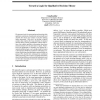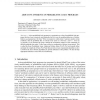77 search results - page 3 / 16 » From conditional probability to the logic of doxastic action... |
CVPR
2004
IEEE
14 years 7 months ago
2004
IEEE
We present Propagation Networks (P-Nets), a novel approach for representing and recognizing sequential activities that include parallel streams of action. We represent each activi...
RSCTC
1993
Springer
13 years 9 months ago
1993
Springer
This paper focuses on the application of rough set constructs to inductive learning from a database. A design guideline is suggested, which provides users the option to choose app...
KR
1994
Springer
13 years 9 months ago
1994
Springer
We present a logic for representing and reasoning with qualitative statements of preference and normality and describe how these may interact in decision making under uncertainty....
ENTCS
2006
13 years 5 months ago
2006
Temporal logics are well suited for the specification and verification of systems of communicating agents. In this paper we adopt a social approach to agent communication, where c...
ICLP
2010
Springer
13 years 9 months ago
2010
Springer
ABSTRACT. Action-probabilistic logic programs (ap-programs) are a class of probabilistic logic programs that have been extensively used during the last few years for modeling behav...


